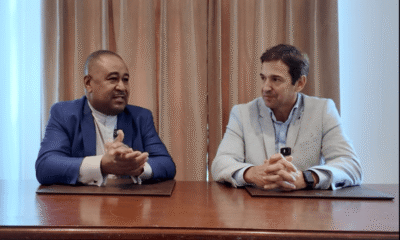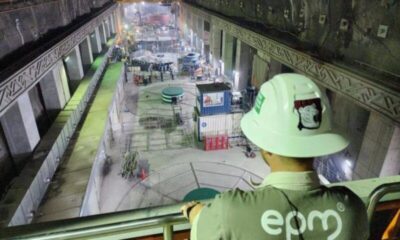What Is Behind the Apparent Attempt to Squeeze Foreign Journalists out of Colombia?
EDITORIAL: In 2017 Colombia’s government signed a formal but controversial peace agreement with the country’s FARC rebel group. In the agreement, the government committed to extensive reintegration efforts, protection for community leaders, and for residents of rural areas that the FARC once controlled. In the 10 months since the accords were ratified, the country has been roundly criticized for failing to live up to its obligations under the agreement.
Also in 2017, the government passed a “visa reform” package that purported to simplify the visa process for foreigners wishing to enter or stay in Colombia. As with the Peace Accord, the promise doesn’t match up with reality.
Legitimate, experienced foreign journalists operating in Colombia are being denied visas by Colombia’s Cancillería (Ministry of Foreign Affairs), a move that seems more in line with the Maduro government next door in Venezuala than in Colombia, a country that just celebrated, after years of trying, accession into the OECD (Organization for Economic Cooperation & Development).
While the argument can be made that the fault lies with Colombia’s congress for the “fine print” that made up the text of the immigration reform bill, it is clear that something unusual is going on. Is the government trying to cover up its failures in the peace process? Or in failing to prevent the macabre parade of assassinations (over 330 since 2016) of community leaders and activists from across the social and political spectrum?
The United Nation’s human rights chief in Colombia, Alberto Brunori was only given a temporary visa, and this after a delay that prevented him from presenting the UN’s annual human rights report, critical of the government’s failure to comply with its side of the bargain negotiated in the peace accord.
Meanwhile, through confirmation with colleagues, correspondents, photojournalists and reporters from some of the largest (not that it should matter) global media outlets have been either denied or are facing complications with their journalist visa issuance or renewal. This includes journalists who have reported for The Washington Post, The Guardian, New York Times, El Tiempo, Bloomberg, MSN, Getty Images; the list is much longer.
“Just because you do not take an interest in politics doesn’t mean politics won’t take an interest in you.” -Pericles (apocryphal)
One excuse given to victims of this apparent crackdown by the government is that the new legislation requires journalists to submit an apostilled and notarized university degree in the field of journalism, verified and signed off on by the Colombian Ministry of Education (!)—an absurd demand! I established Finance Colombia 4 years ago, and I am proud of our journalism and our professional team. I have a degree neither in finance nor journalism, but I did spend a decade in the US stock markets, owned an insurance brokerage, and managed institutional real estate portfolios as part of a corporate team.
Before launching Finance Colombia, I worked as senior or managing editor of 4 different print & online news publications, worked full time as senior editor for a hardcover business book publisher in the US, edited or published several books, from novels to non-fiction exposés of political corruption; but under the new draconian (anti-) journalism visa regulations, it could be argued I don’t qualify because I don’t have a journalism degree. 30 years ago I took my first full time position with a print newspaper in a major US city as sports editor and director of photography, where I ran the darkroom (back then we used chemicals), and was responsible for the quality of the newspaper’s photography. In addition to photography which is my passion, I have worked in television engineering for ESPN and prime time production for ABC in the US.
For photojournalists the situation may be even more dire. A small minority of professional photographers have degrees in photography or photojournalism. Most universities in the US don’t even offer such a degree. Like sculptors or artists, your credential is your body of work.
This isn’t about me, I dare write this opinion piece because I feel relatively safe. I have a long-term visa and other interests in Colombia that give me the confidence to speak out—though nothing is assured. Neither is this about Colombia’s sovereign right to control who passes within its borders, a right that I absolutely support and respect. Legally at least, my ability to live and work in Colombia is a privilege, not a right.
Still, when a country makes what can only be interpreted as obvious moves to restrict access and coverage by foreign journalists at this critical time in Colombia’s history, everyone with a conscience, journalist or not, Colombian or not, has a duty to speak out.
I am proud of what my team and I have done at Finance Colombia in the last 4 years. Like many publications, what started out as “some dude with a laptop” has grown into what I hope is a meaningful and positive contribution to Colombia’s economic and societal advancement.
As Finance Colombia’s publisher, I call on Colombia’s government to end this repression, intentional or not of foreign journalists and revise both its written policy and apparent unwritten strategy that muzzles the diffusion of diverse yet responsible reporting. In the long run, this reporting, even what might be perceived as “negative stories” only helps the country to advance.
This very morning I finished the book “Bad Blood” by John Carreyrou. It is the account of how one Wall Street Journal investigative reporter exposed Silicon Valley biotech company Theranos as a multi-billion dollar fraud. In this case, journalism actually saved lives, as the biotech firm had inked a deal to deploy its dangerous blood testing machines across the US in a deal with national pharmacy chain Walgreens. Thanks to journalists we know about The Pentagon Papers and Watergate. Countless journalists in Colombia and other countries have become martyrs for the sake of their calling. I have colleagues here in Colombia right now that have recent death threats against them.
“Bad men need nothing more to compass their ends, than that good men should look on and do nothing.” – John Stuart Mill
Colombia has a new government, and these problems seem to have started and taken place largely under the latter days of the Santos administration: Surprising as former President and Nobel Peace Prize winner Juan Manuel Santos was an award winning (Nieman Fellow) reporter and columnist in his own right before becoming a politician. Santos is from a family of journalists: his family controlled the country’s largest newspaper El Tiempo for almost a century, until shortly before Santos’ presidential campaign. One of his brothers served as editor.
I am willing to give the Duque administration the benefit of the doubt, perhaps they had nothing to do with, or didn’t know of the dire situation facing foreign journalists in Colombia. But especially if that is true, we call on the new government to right these wrongs, take the muzzle off legitimate, qualified foreign journalists, and demonstrate by its actions that it supports and promotes the free exchange of ideas, news, insight, and opinion.
We also call on neighboring countries of The Americas, Europe and, multilateral organizations such as the OECD, EU, UN, OAS, and NGOs such as RSF, FLIP and the Pulitzer Center to encourage the Colombian government to take immediate action to admit and protect these journalists. As a US citizen, I ask the US government to leverage our close, friendly and benevolent relations with Colombia to encourage them to “do the right thing.” This issue is already being raised through diplomatic channels, and I am optimistic that soon we will once again be headed in the right direction.
We are here to help. Let us do our job.
Inside photo credit: Pixabay
Cover photo credit: Leidy Yrani Osorio Ramirez
























